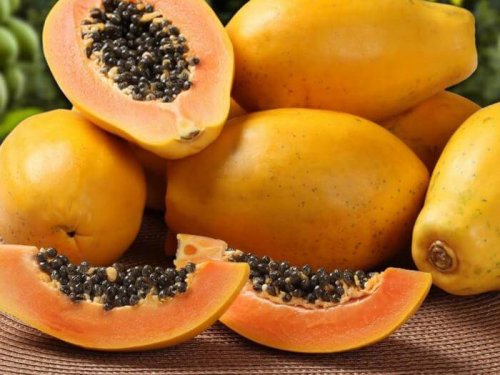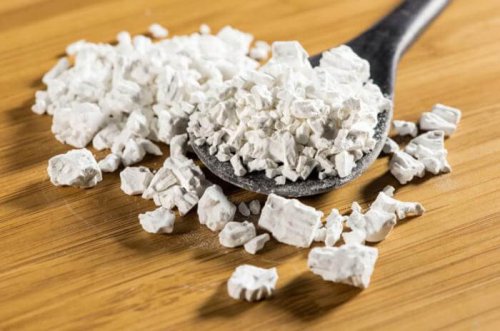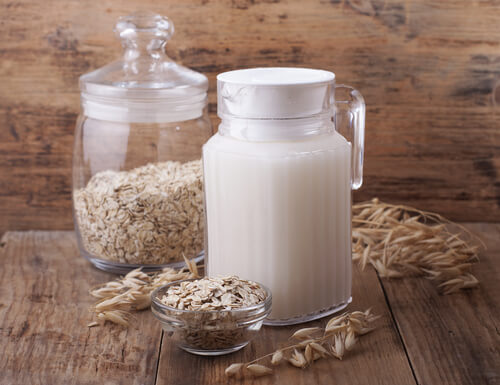10 Safe Foods for Sensitive Stomachs

People who have sensitive stomachs need to be careful of their diet if they want to have a good quality of life. Fortunately, certain foods can be very helpful for sensitive stomachs. This is thanks to their ability to help reduce inflammation in your intestine and repopulate your bacterial flora.
In this article, find out about the 10 best foods for taking care of sensitive stomachs.

The Best Foods for Sensitive Stomachs
1. Agar agar
First, agar agar is an algae that’s used in foods to make gelatin. Many vegetarians eat it to avoid animal-based gelatin. This ingredient can thicken up any liquid. After all, the more you add, the thicker it will get.
Agar agar is a vegetable-based gelatin that has the ability to help regulate your intestinal function. This is even true if you suffer from diarrhea. It does this thanks to its pre-biotic fiber and minerals like magnesium, iodine, and calcium.
2. Chia seeds and linseed

Next, chia seeds and linseed are popular because they boost your intestinal functions. Plus, they do this without irritating this organ or its bacteria flora.
- When you soak them, they release their mucilage. This is a type of soluble fiber that makes water gelatinous.
- When you drink this liquid with the seeds, you get a deep intestinal cleansing. Naturally, this is great for sensitive stomachs.
3. Fermented foods
In addition, foods that have been made through fermentation are very beneficial. After all, they repopulate and protect your intestinal bacteria.
Unfortunately, your intestinal flora can suffer the consequences of a bad diet, antibiotics, or from intestinal diseases. However, fermented foods can come to the rescue!
- The most popular fermented foods are natural yogurt, kefir, sauerkraut, and kombucha tea.
4. Papaya

Papaya is a delicious tropical fruit that’s very good for your digestive system. At an intestinal level, it has a gentle laxative and cleaning effect. Plus, it’s very helpful for cases of constipation, diverticulitis, or parasites.
- We recommend eating it raw for breakfast. This can either be in pieces or in juices or smoothies.
5. Apples
Next, apples are a great fruit for improving and balancing your digestion. Plus, they can even help treat intestinal diseases depending on how you eat them.
- If you eat an apple raw with its skin, you help your intestinal movement. This fights constipation thanks to soluble fiber and improves your intestinal activity. In addition, it also strengthens the muscles of your digestive system.
- If you eat apples peeled and grated and you let them get brown, you can calm diarrhea. They have this effect thanks to the tannins that appear when they oxidizes and because of their high pectin content. This retains water and slows intestinal movement.
Also read:
Try This Natural Remedy for Heartburn with Baking Soda
6. Kuzu

- Kuzu dissolves in water. Then, you can heat it until it becomes thick.
- After it’s prepared and cooled, you can drink it.
7. Coffee grinds
Believe it or not, coffee grinds can also help sensitive stomachs. This is a very interesting remedy that’s very effective for calming intestinal inflammation.
- You just need to drink a tablespoon of coffee grounds with a glass of water in the morning.
- You should do this at least half an hour before eating breakfast.
With this easy remedy, you’ll see almost instantaneous relief.
8. Seawater
Next, seawater is good as a medicinal treatment for sensitive stomachs. After all, it’s rich in minerals and trace minerals. These regulate your intestinal function if you drink them correctly.
Ingredients
- 1/4 cup of sea water
- 3/4 cup of water
Instructions
- Mix the two kinds of water.
- Then, sip a cup of it for breakfast.
9. Plantain
Plantain is a medicinal plant that you can drink as a tea. Plus, it has the benefit of being able to calm and balance your stomach. As a result, it’s very helpful in cases of diarrhea, gastritis, peptic ulcers, or irritable bowels.
You might be interested in:
7 Health Benefits of Green Plantains
10. Oats

Finally, oats are a great cereal that’s rich in fiber and mucilage. These are two ingredients that are very good for treating any intestinal problem.
For oats to be effective, you need to eat them cooked or soaked. This is because if you eat them raw, they could be difficult to digest or cause heartburn.
In addition, oats are also very nutritious. They give you energy and strength. Plus, they also relax your nervous system, which prevents problems like nervousness, irritability, and anxiety
All cited sources were thoroughly reviewed by our team to ensure their quality, reliability, currency, and validity. The bibliography of this article was considered reliable and of academic or scientific accuracy.
- Higashimura Y, Naito Y, Takagi T, Mizushima K, Hirai Y, Harusato A, Ohnogi H, Yamaji R, Inui H, Nakano Y, Yoshikawa T. Oligosaccharides from agar inhibit murine intestinal inflammation through the induction of heme oxygenase-1 expression. (2013).
- Plaza Díaz J., Ruiz Ojeda FJ., Vilchez Padial LM., Gil A., Evidence of the anti inflammatory effects of probiotics and synbiotics in intestinal chronic diseases. Nutrient, 2017.
- Okeniyi JA, Ogunlesi TA, Oyelami OA, Adeyemi LA. Effectiveness of dried Carica papaya seeds against human intestinal parasitosis: a pilot study. (2007).
This text is provided for informational purposes only and does not replace consultation with a professional. If in doubt, consult your specialist.








